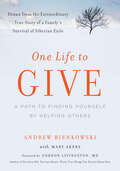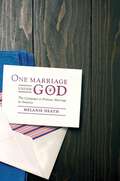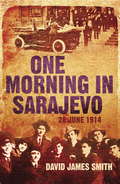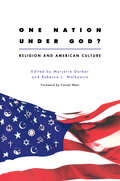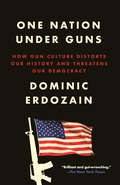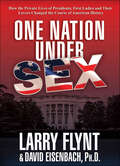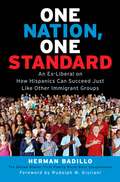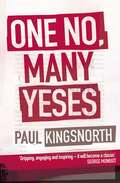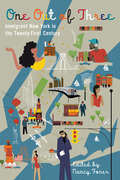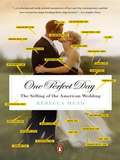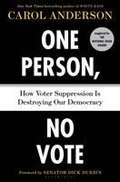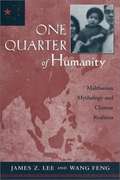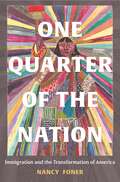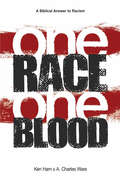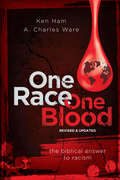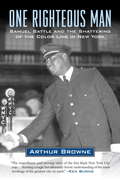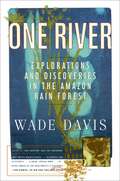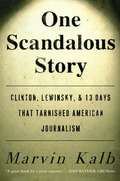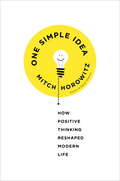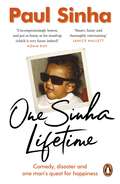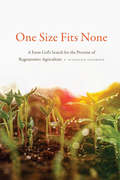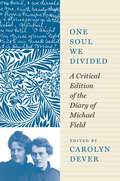- Table View
- List View
One Life to Give: A Path To Finding Yourself By Helping Others
by Andrew BienkowskiFind Yourself by Helping Others—Life Lessons from an Extraordinary Story of Sacrifice and Survival In the winter of 1939, five-year-old Andrew Bienkowski was exiled to Siberia with his family. The two years of struggle that followed—especially his grandfather’s amazing act of sacrifice during their first long, cold winter—have informed the rest of Andrew’s life. Thanks to his devoted mother, his quick-witted grandmother, and the unexpected kindness of strangers, Andrew established an approach to life that emphasizes helping others as the essential path to finding our greatest human fulfillment.
One Marriage Under God: The Campaign to Promote Marriage in America (Intersections #16)
by Melanie HeathThe meaning and significance of the institution of marriage has engendered angry and boisterous battles across the United States. While the efforts of lesbians and gay men to make marriage accessible to same-sex couples have seen increasing success, these initiatives have sparked a backlash as campaigns are waged to “protect” heterosexual marriage in America. Less in the public eye is government legislation that embraces the idea of marriage promotion as a necessary societal good. In this timely and extensive study of marriage politics, Melanie Heath uncovers broad cultural anxieties that fuel on-the-ground practices to reinforce a boundary of heterosexual marriage, questioning why marriage has become an issue of pervasive national preoccupation and anxiety, and explores the impact of policies that seek to reinstitutionalize heterosexual marriage in American society. From marriage workshops for the general public to relationship classes for welfare recipients to marriage education in high school classrooms, One Marriage Under God documents in meticulous detail the inner workings of ideologies of gender and heterosexuality in the practice of marriage promotion to fortify a concept of “one marriage,” an Anglo-American ideal of Christian, heterosexual monogamy.
One More River to Cross: Black and Gay in America, First Edition
by Keith BoykinIn organizing the 1993 March on Washington for gay and lesbian rights, leaders of the gay community consciously paralleled Martin Luther King's historic 1963 March on Washington and proclaimed their mission was "a simple matter of justice." In response, black leaders and ministers across the country challenged any comparison between blacks and gays as offensive and irrational. In One More River to Cross, Keith Boykin clarifies the relationship between blacks and gays in America by portraying the "common ground" lives of those who are both black and gay. <P><P>Against a historical backdrop of civil rights and the black experience in America, Boykin interviews Baptist ministers, gay political leaders, and other black gays and lesbians on issues of faith, family, discrimination, and visibility to determine what differences-- real and imagined-- separate the two communities. Boykin points to evidence of African and precolonial same-sex behavior, as well as figures like James Baldwin and Bayard Rustin, to dispel the myth that homosexuality is a "white thang," while his research suggests that blacks are less homophobic than whites, despite the rhetoric of rap and religion. With stories from his own experience as well as that of other black gays and lesbians, Boykin targets gay racism and black homophobia and suggests that conservative forces have substituted the common language of racism for homophobia in order to prevent a potentially powerful coalition of blacks and gays. <P><P>By portraying what it means to be black and gay in America, One More River to Cross offers an extraordinary window into a community that challenges this country's acceptance of its minorities, both racial and sexual.
One Morning In Sarajevo: The true story of the assassination that changed the world
by David James SmithSarajevo, 28 June 1914: The story of the assassination that changed the world.A historical account of the assassination of Archduke Franz Ferdinand. Using newly available sources and older material, David James Smith brilliantly reinvestigates and reconstructs the events which subsequently determined the shape of the twentieth century.Young Gavrilo Princip arrived at the Vlajnic pastry shop in Sarajevo in Bosnia-Herzegovina on the morning of 28 June 1914. He was greeted by his fellow conspirators in the plot to kill Archduke Franz Ferdinand. The Archduke, next in line to succeed as Emperor of Austria, was beginning a state visit to Sarajevo later that morning. Ferdinand was not a very popular character - widely thought of as bad-tempered and arrogant and perhaps even deranged. To the young students he embodied everything they loathed about imperial oppression. They planned to kill him at about 11 o'clock as he paraded down Appel Quay to the town hall in his open top car.What happened in those few hours - leading as it did to the First and Second World Wars - is as compelling as any thriller.
One Nation Under God?: Religion and American Culture (CultureWork: A Book Series from the Center for Literacy and Cultural Studies at Harvard)
by Marjorie Garber Rebecca L. WalkowitzOne Nation Under God? is a remarkable consideration of how religion manifests itself in America today.
One Nation Under Guns: How Gun Culture Distorts Our History and Threatens Our Democracy
by Dominic ErdozainThis takedown of American gun culture argues that the nation&’s founders did not intend the Second Amendment to guarantee an individual right to bear arms—and that this distortion of the record is an urgent threat to democracy.&“At once eye-opening and enraging, One Nation Under Guns is that rare book that can help change the way we live in this country.&”—Eddie S. Glaude Jr., bestselling author of Begin AgainMore than a hundred lives are lost to firearms every day in America. The cost is more than the numbers—it is the fear, the anxiety, the dread of public spaces that an armed society has created under the tortured rubric of freedom. But the norms of today are not the norms of American history or the values of its founders. They are the product of a gun culture that has imposed its vision on a sleeping nation.Historian Dominic Erdozain argues that we have wrongly ceded the big-picture argument on guns: As we parse legislation on background checks and automatic-weapons bans, we fail to ask what place guns should have in a functioning democracy. Taking readers on a brilliant historical journey, Erdozain shows how the founders feared the tyranny of individuals as much as the tyranny of kings—the idea that any person had a right to walk around armed was anathema to their notion of freedom and the peaceful republic they hoped to build. They wrote these ideas into the Constitution and the Bill of Rights, ideas that were subsequently affirmed by two centuries of jurisprudence.And yet the twin scourges of racism and nationalism would combine to create a darker American vision—a rogue and reckless freedom based on birth and blood. It was this freedom, not the liberty promised by the Constitution, that generated our modern gun culture, with its mystic conceptions of good guys and bad guys, innocence and guilt. By the time the U.S. Supreme Court reinvented the Second Amendment in 2008&’s District of Columbia v. Heller, an opinion that Erdozain convincingly eviscerates, many Americans had already acceded to the fiction: the unfreedom of an armed society. To save our democracy, he argues, we must fight for the founders&’ true idea of what it means to be free.
One Nation Under Sex: How the Private Lives of Presidents, First Ladies and Their Lovers Changed the Course of American History
by David Eisenbach Larry Flynt“Americans often like to think that extramarital sex—or even a strong libido—is somehow a sign of poor character in our presidents. One Nation Under Sex explodes that myth...You don’t have to agree with all of Larry Flynt’s and David Eisenbach’s readings of history to enjoy this sex-filled tour through more than 200 years of scandal.”—David Greenberg, author of Republic of Spin: An Inside History of the American PresidencyBen Franklin saved the American Revolution by seducing French Women. A gay love affair between President James Buchanan and Senator William King aided the secession movement. Woodrow Wilson’s girlfriend dictated his letters to the German Kaiser. And lesbian relationships inspired Eleanor Roosevelt to become a revolutionary crusader for equal rights. The colorful sex lives of America’s most powerful leaders have influenced social movements, government policies, elections and even wars, yet they are so whitewashed by historians that people think Thomas Jefferson and Abe Lincoln were made of marble, not flesh and blood.But the truth is about to come out. In One Nation Under Sex, free speech activist and notorious Hustler magazine publisher Larry Flynt teams up with Columbia University history professor David Eisenbach to peek behind the White House bedroom curtains and document how hidden passions have shaped public life. They unpack salacious rumors and outright scandals, showing how private affairs have driven pivotal decisions—often with horrific consequences. Along the way, they explore the origins of America’s fascination with sex scandals and explain how we can put aside out political moralism and begin focusing on the real problems that threaten our nation.
One Nation, One Standard
by Herman BadilloWhy aren't Hispanics succeeding like Asians, Jews, and other immigrant groups in America? Herman Badillo's answer is as politically incorrect as the question: Hispanics simply don't put the same emphasis on education as other immigrant groups. As the nation's first Puerto Rican-born U. S. congressman, the trailblazing Badillo once supported bilingual education and other government programs he thought would help the Hispanic community. But he came to see that the real path to prosperity, political unity, and the American mainstream is self-reliance, not big government. Now Badillo is a champion of one standard of achievement for all races and ethnicities. In this surprising and controversial manifesto, you will learn:* Why Hispanic culture's trouble with education, democracy, and economics stems from Mother Spain and the "five-hundred year siesta" she induced in Latin America. * Why the Congressman who drafted the first Spanish-English bilingual education legislation now believes that bilingual education hurts students more than it helps. * Why "social promotion" - putting minority students' self-esteem ahead of their academic performance and then admitting them to college unprepared - continues to this day, despite the system's documented failures and injustices. * How self-identifying as "Hispanic" or "white" or "black" undermines achievement, and what lessons we can learn from Latin American countries, where one's race is irrelevant. With Central and Latin America exporting a large portion of their poor, Hispanics are on the way to becoming a majority in the United States. . . but one with all the problems of a minority culture. Badillo's solution to this problem relies on traditional values: hard work, education, and achievement. His lessons are important not only for Hispanics but for every American.
One Nation, One Standard
by Herman BadilloWhy aren't Hispanics succeeding like Asians, Jews, and other immigrant groups in America? Herman Badillo's answer is as politically incorrect as the question: Hispanics simply don't put the same emphasis on education as other immigrant groups. As the nation's first Puerto Rican-born U.S. congressman, the trailblazing Badillo once supported bilingual education and other government programs he thought would help the Hispanic community. But he came to see that the real path to prosperity, political unity, and the American mainstream is self-reliance, not big government. Now Badillo is a champion of one standard of achievement for all races and ethnicities. In this surprising and controversial manifesto, you will learn: Why Hispanic culture's trouble with education, democracy, and economics stems from Mother Spain and the "five-hundred year siesta" she induced in Latin America. Why the Congressman who drafted the first Spanish-English bilingual education legislation now believes that bilingual education hurts students more than it helps. Why "social promotion" -- putting minority students' self-esteem ahead of their academic performance and then admitting them to college unprepared -- continues to this day, despite the system's documented failures and injustices. How self-identifying as "Hispanic" or "white" or "black" undermines achievement, and what lessons we can learn from Latin American countries, where one's race is irrelevant. With Central and Latin America exporting a large portion of their poor, Hispanics are on the way to becoming a majority in the United States... but one with all the problems of a minority culture. Badillo's solution to this problem relies on traditional values: hard work, education, and achievement. His lessons are important not only for Hispanics but for every American.
One No, Many Yeses
by Paul KingsnorthThe Global Resistance Movement is one of the 21st century’s most active and influential organizations. It is a global coalition of millions united in resisting and building alternatives to an out-of-control global economy. It emerged in Mexico in 1994 when the Zapatista rebels rose up in defiance of the North American Free Trade Agreement. The West first noticed it in Seattle in 1999 when the World Trade Organization was stopped in its tracks by 50,000 protesters. More significantly, the anti-capitalist street protests are only the tip of its iceberg. It aims to shake the foundations of the global economy and change the course of history. But what exactly is it? Who is involved, what do they want, and how do they aim to get it? To find out, Paul Kingsnorth traveled across four continents to visit some of the epicenters of the movement. In the process, he was tear-gassed on the streets of Genoa; painted anti-WTO puppets in Johannesburg; met a tribal guerrilla with supernatural powers; took a hot bath in Arizona with a pie-throwing anarchist; and infiltrated the world's biggest gold mine in New Guinea. Along the way, he found a new political movement and a new political idea. It is united in what it opposes and deliberately diverse in what it wants instead.
One Out of Three: Immigrant New York in the Twenty-First Century
by Nancy FonerThis absorbing anthology features in-depth portraits of diverse ethnic populations, revealing the surprising new realities of immigrant life in twenty-first-century New York City. Contributors show how nearly fifty years of massive inflows have transformed New York City's economic and cultural life and how the city has changed the lives of immigrant newcomers.Nancy Foner's introduction describes New York's role as a special gateway to America. Subsequent essays focus on the Chinese, Dominicans, Jamaicans, Koreans, Liberians, Mexicans, and Jews from the former Soviet Union now present in the city and fueling its population growth. They discuss both the large numbers of undocumented Mexicans living in legal limbo and the new, flourishing community organizations offering them opportunities for advancement. They recount the experiences of Liberians fleeing a war torn country and their creation of a vibrant neighborhood on Staten Island's North Shore. Through engaging, empathetic portraits, contributors consider changing Korean-owned businesses and Chinese Americans' increased representation in New York City politics, among other achievements and social and cultural challenges. A concluding chapter follows the prospects of the U.S.-born children of immigrants as they make their way in New York City.
One Perfect Day
by Rebecca MeadAstutely observed and deftly witty, One Perfect Day masterfully mixes investigative journalism and social commentary to explore the workings of the wedding industry?an industry that claims to be worth $160 billion to the U. S. economy and which has every interest in ensuring that the American wedding becomes ever more lavish and complex. Taking us inside the workings of the wedding industry?including the swelling ranks of professional event planners, department stores with their online registries, the retailers and manufacturers of bridal gowns, and the Walt Disney Company and its Fairy Tale Weddings program?New Yorker writer Rebecca Mead skillfully holds the mirror up to the bride?s deepest hopes and fears about her wedding day, revealing that for better or worse, the way we marry is who we are. .
One Perfect Day: The Selling of the American Wedding
by Rebecca MeadAstutely observed and deftly witty, One Perfect Day masterfully mixes investigative journalism and social commentary to explore the workings of the wedding industry?an industry that claims to be worth $160 billion to the U.S. economy and which has every interest in ensuring that the American wedding becomes ever more lavish and complex. Taking us inside the workings of the wedding industry?including the swelling ranks of professional event planners, department stores with their online registries, the retailers and manufacturers of bridal gowns, and the Walt Disney Company and its Fairy Tale Weddings program?New Yorker writer Rebecca Mead skillfully holds the mirror up to the bride?s deepest hopes and fears about her wedding day, revealing that for better or worse, the way we marry is who we are.
One Person, No Vote: How Voter Suppression is Destroying Our Democracy
by Carol Anderson<p>In her New York Times bestseller White Rage, Carol Anderson laid bare an insidious history of policies that have systematically impeded black progress in America, from 1865 to our combustible present. With One Person, No Vote, she chronicles a related history: the rollbacks to African American participation in the vote since the 2013 Supreme Court decision that eviscerated the Voting Rights Act of 1965. Known as the Shelby ruling, this decision effectively allowed districts with a demonstrated history of racial discrimination to change voting requirements without approval from the Department of Justice. <p>Focusing on the aftermath of Shelby, Anderson follows the astonishing story of government-dictated racial discrimination unfolding before our very eyes as more and more states adopt voter suppression laws. In gripping, enlightening detail she explains how voter suppression works, from photo ID requirements to gerrymandering to poll closures. In a powerful new afterword, she examines the repercussions of the 2018 midterm elections. And with vivid characters, she explores the resistance: the organizing, activism, and court battles to restore the basic right to vote to all Americans.</p>
One Quarter of Humanity
by James Z. Lee Wang FengThis book presents evidence about historical and contemporary Chinese population behavior that overturns much of the received wisdom about the differences between China and the West first voiced by Malthus. Malthus described a China in which early and universal marriage ensured high fertility and therefore high mortality. He contrasted this with Western Europe, where marriage occurred late and was far from universal, resulting in lower fertility and higher demographic responsiveness to economic circumstances. The result in China was thought to be mass misery as part of the population teetered on the brink of a Malthusian precipice, whereas in the West conditions were less severe. In reality, James Lee and Wang Feng argue, there has been effective regulation of population growth in China through a variety of practices that depressed marital fertility to levels far below European standards, and through the widespread practices of infanticide and abortion. Moreover, in China, population behavior has long been primarily a consequence of collective intervention. This collective culture underlies four distinctive features of the Chinese demographic pattern--high rates of female infanticide, low rates of male marriage, low rates of marital fertility, and high rates of adoption--that Lee and Wang trace from 1700 to today. These and other distinctive features of the Chinese demographic and social system, they argue, led to a different demographic transition in China from the one that took place in the West.
One Quarter of the Nation: Immigration and the Transformation of America
by Nancy FonerAn in-depth look at the many ways immigration has redefined modern AmericaThe impact of immigrants over the past half century has become so much a part of everyday life in the United States that we sometimes fail to see it. This deeply researched book by one of America’s leading immigration scholars tells the story of how immigrants are fundamentally changing this country.An astonishing number of immigrants and their children—nearly eighty-six million people—now live in the United States. Together, they have transformed the American experience in profound and far-reaching ways that go to the heart of the country’s identity and institutions.Unprecedented in scope, One Quarter of the Nation traces how immigration has reconfigured America’s racial order—and, importantly, how Americans perceive race—and played a pivotal role in reshaping electoral politics and party alignments. It discusses how immigrants have rejuvenated our urban centers as well as some far-flung rural communities, and examines how they have strengthened the economy, fueling the growth of old industries and spurring the formation of new ones. This wide-ranging book demonstrates how immigration has touched virtually every facet of American culture, from the music we dance to and the food we eat to the films we watch and books we read.One Quarter of the Nation opens a new chapter in our understanding of immigration. While many books look at how America changed immigrants, this one examines how they changed America. It reminds us that immigration has long been a part of American society, and shows how immigrants and their families continue to redefine who we are as a nation.
One Race One Blood
by Ken Ham A. Charles WareIt is a rarely discussed fact of history that the premise of Darwinian evolution has been deeply rooted in the worst racist ideology since its inception. Read a thorough account of the effects of evolution on the history of the United States and discrimination based on ethnicity, including slavery and the Civil rights movement. One Race One Blood goes one step farther to show the global harvest of death and tragedy that still finds its roots in Darwin's destructive writings. The tragic legacy of Darwin's controversial speculations on evolution has led to terrible consequences taken to the deadliest extremes. One Race One Blood reveals the origins of these horrors, as well as the proof revealed in Scripture that God created only one race. You will discover: Nazi Germany used evolutionary concepts to justify the extermination of "unfit" people groups such as Jews, Gypsies, and Slavs The origins of people groups, the genetics of skin color, and what the Bible says about "interracial" marriage Eye-opening discussion on racism and its roots in the hearts and minds of millions still today. Within these compelling pages, Dr. A. Charles Ware, president of Crossroads Bible College, and Ken Ham, president of Answers in Genesis examine the historical roots of racism that have permeated evolutionary thought, and the Bible's response to this disturbing issue. This is a crucial and timely study that profoundly addresses the Christian worldview regarding "race" from a compassionate and uniquely compelling perspective.
One Race One Blood (Revised & Updated): The Biblical Answer to Racism
by Ken Ham Charles WareOne Race One Blood reveals the origins of the horrors of discrimination, the biblical truth of “interracial” marriage, as well as the proof revealed in the Bible that God created only one race. Explore the science of genetics, melanin and skin tone, affected by the history of the Tower of Babel and the origin of people groups around the world. DivisionsEthnic cleansing, genocide, “racial” conflicts have taken place from colonialism to Nazi Germany to modern day. We are a society, nation, and world in continued conflict. We are increasingly being identified and divided by designations of “racial” groups. Many of these unfortunate divisions have been fueled by the troublesome threads of “scientific” racism which emerged from Darwinian evolution. SolutionsEducation can teach, workshops can inform, laws can protect, but what is the defining answer to ending the notion of “racial” division? Since racism is a heart issue – a sin issue – it is one that only the truth of God’s inerrant Word will overcome. Truths“And hath made of one blood all nations of men for to dwell on all the face of the earth….” (Acts 17:26 KJV)
One Righteous Man
by Arthur BrowneA history of African Americans in New York City from the 1910s to 1960, told through the life of Samuel Battle, the New York Police Department's first black officer. When Samuel Battle broke the color line as New York City's first African American cop in the second decade of the twentieth century, he had to fear his racist colleagues as much as criminals. He had to be three times better than his white peers, and many times more resilient. His life was threatened. He was displayed like a circus animal. Yet, fearlessly claiming his rights, he prevailed in a four-decade odyssey that is both the story of one man's courageous dedication to racial progress and a harbinger of the divisions between police and the people they serve that plague twenty-first-century America. By dint of brains, brawn, and an outsized personality, Battle rode the forward wave of African American history in New York. He circulated among renowned turn-of-the-century entertainers and writers. He weathered threatening hostility as a founding citizen of black Harlem. He served as "godfather" to the regiment of black soldiers that won glory in World War I as the "Hellfighters of Harlem." He befriended sports stars like Joe Louis, Jesse Owens, and Sugar Ray Robinson, and he bonded with legendary tap dancer Bill "Bojangles" Robinson. Along the way, he mentored an equally smart, equally tough young man in a still more brutal fight to integrate the New York Fire Department. At the close of his career, Battle looked back proudly on the against-all-odd journey taken by a man who came of age as the son of former slaves in the South. He had navigated the corruption of Tammany Hall, the treachery of gangsters like Lucky Luciano and Dutch Schultz, the anything-goes era of Prohibition, the devastation of the Depression, and the race riots that erupted in Harlem in the 1930s and 1940s. By then he was a trusted aide to Mayor Fiorello La Guardia and a friend to First Lady Eleanor Roosevelt. Realizing that his story was the story of race in New York across the first half of the century, Battle commissioned a biography to be written by none other than Langston Hughes, the preeminent voice of the Harlem Renaissance. But their eighty-thousand-word collaboration failed to find a publisher, and has remained unpublished since. Using Hughes's manuscript, which is quoted liberally throughout this book, as well as his own archival research and interviews with survivors, Pulitzer Prize-winning journalist Arthur Browne has created an important and compelling social history of New York, revealed a fascinating episode in the life of Langston Hughes, and delivered the riveting life and times of a remarkable and unjustly forgotten man, setting Samuel Battle where he belongs in the pantheon of American civil rights pioneers.
One River: Science, Adventure And Hallucinogenics In The Amazon Basin
by Wade DavisThe story of two generations of scientific explorers in South America—Richard Evans Schultes and his protégé Wade Davis—an epic tale of adventure and a compelling work of natural history.In 1941, Professor Richard Evan Schultes took a leave from Harvard and disappeared into the Amazon, where he spent the next twelve years mapping uncharted rivers and living among dozens of Indian tribes. In the 1970s, he sent two prize students, Tim Plowman and Wade Davis, to follow in his footsteps and unveil the botanical secrets of coca, the notorious source of cocaine, a sacred plant known to the Inca as the Divine Leaf of Immortality.A stunning account of adventure and discovery, betrayal and destruction, One River is a story of two generations of explorers drawn together by the transcendent knowledge of Indian peoples, the visionary realms of the shaman, and the extraordinary plants that sustain all life in a forest that once stood immense and inviolable.
One Scandalous Story
by Marvin KalbIn 1963 Marvin Kalb observed the Secret Service escorting an attractive woman into a hotel for what was most likely a rendezvous with President Kennedy. Kalb, then a news correspondent for CBS, didn't consider the incident newsworthy. Thirty-five years later, Kalb watched in dismay as the press dove headfirst into the scandal of President Clinton's affair with White House intern Monica Lewinsky, disclosing every prurient detail. How and why had the journalistic landscape shifted so dramatically? One Scandalous Story seeks to answer this critical question through the inside story of thirteen days -- January 13-25, 1998 -- that make up a vital chapter in the history of American journalism. In riveting detail, Kalb examines just how the media covered the Lewinsky scandal, offering what he calls an "X-ray of the Washington press corps." Drawing on hundreds of original interviews, Kalb allows us to eavesdrop on the incestuous deals between reporters and sources, the bitter disagreements among editors, the machination of moguls for whom news is Big Business, and above all, the frantic maneuvering to break the story. With fresh insight, he retraces decisions made by Michael Isikoff of Newsweek, Internet renegade Matt Drudge, Jackie Judd of ABC, Clinton-basher Lucianne Goldberg, Susan Schmidt of The Washington Post, Jackie Bennett of the Office of the Independent Counsel, and other key players in this scandal that veered from low comedy to high drama. Through the lens of those thirteen turbulent days, Kalb offers us a portrait of the "new news" in all its contradictions. He reveals how intense economic pressures in the news business, the ascendancy of the Internet, the blurring of roles between reporters and commentators, and a surge of dubious sourcing and "copy-cat journalism" have combined to make tabloid-style journalism increasingly mainstream. But are we condemned to a resurgence of "yellow journalism"? Painstakingly documented and sobering in its conclusions, One Scandalous Story issues a clarion call to newsmakers and the American public alike: "Journalism can change for the better -- and must."
One Simple Idea
by Mitch HorowitzFrom the millions-strong audiences of Oprah and The Secret to the mass-media ministries of evangelical figures like Joel Osteen and T. D. Jakes, to the motivational bestsellers and New Age seminars to the twelve-step programs and support groups of the recovery movement and to the rise of positive psychology and stress-reduction therapies, this idea--to think positively--is metaphysics morphed into mass belief. This is the biography of that belief. No one has yet written a serious and broad-ranging treatment and history of the positive-thinking movement. Until now. For all its influence across popular culture, religion, politics, and medicine, this psycho-spiritual movement remains a maligned and misunderstood force in modern life. Its roots are unseen and its long-range impact is unacknowledged. It is often considered a cotton-candy theology for New Agers and self-help junkies. In response, One Simple Idea corrects several historical misconceptions about the positive-thinking movement and introduces us to a number of colorful and dramatic personalities, including Napoleon Hill and Norman Vincent Peale, whose books and influence have touched the lives of tens of millions across the world.
One Sinha Lifetime: Comedy, disaster and one man’s quest for happiness
by Paul Sinha'That night, I'd survived my life flashing before me, with my dignity intact. Yes, this chaotic life has always been a gamble.... But what a gamble.'Paul Sinha is an award-winning comedian, a quizzing mastermind and a happily-married husband. But for much of his life none of these seemed remotely imaginable.As a boy, Paul struggled to find his place in a world where he didn't quite fit. Who was he? An over-achieving schoolkid with the world's knowledge at his fingertips? A traditional Bengali son, destined for a career in medicine that he never once craved? A young gay man yearning to breathe freely? Or was he yet another flawed human being on a self-destruct mission?Amid life's mayhem, it was frequently Paul's love of facts in which he found solace, whether funding his lifestyle through quiz machines or simply trying to show off to his mates. Stumbling serendipitously into both a career in stand-up and a clandestine network of competitive quizzers introduced him to a new sense of purpose, a new identity, and, eventually, new love...A hilarious and moving coming-of-age memoir of one man's search for fulfilment, One Sinha Lifetime is an unconventional odyssey through love, family, and the joy of general knowledge.
One Size Fits None: A Farm Girl's Search for the Promise of Regenerative Agriculture
by Stephanie Anderson“Sustainable” has long been the rallying cry of agricultural progressives; given that much of our nation’s farm and ranch land is already degraded, however, sustainable agriculture often means maintaining a less-than-ideal status quo. Industrial agriculture has also co-opted the term for marketing purposes without implementing better practices. Stephanie Anderson argues that in order to provide nutrient-rich food and fight climate change, we need to move beyond sustainable to regenerative agriculture, a practice that is highly tailored to local environments and renews resources. In One Size Fits None Anderson follows diverse farmers across the United States: a South Dakota bison rancher who provides an alternative to the industrial feedlot; an organic vegetable farmer in Florida who harvests microgreens; a New Mexico super-small farmer who revitalizes communities; and a North Dakota midsize farmer who combines livestock and grain farming to convert expensive farmland back to native prairie. The use of these nontraditional agricultural techniques show how varied operations can give back to the earth rather than degrade it. This book will resonate with anyone concerned about the future of food in America, providing guidance for creating a better, regenerative agricultural future.
One Soul We Divided: A Critical Edition of the Diary of Michael Field
by Michael FieldThe first book-length selection from the extraordinary unpublished diary of the late-Victorian writer “Michael Field”—the pen name of two female coauthors and romantic partnersMichael Field was known to late-Victorian readers as a superb poet and playwright—until Robert Browning let slip Field’s secret identity: in fact, “Michael Field” was a pseudonym for Katharine Bradley (1846–1914) and Edith Cooper (1862–1913), who were lovers, a devoted couple, and aunt and niece. For thirty years, they kept a joint diary titled Works and Days that eventually reached almost 10,000 pages. One Soul We Divided is the first critical edition of selections from this remarkable unpublished work.A fascinating personal and literary experiment, the diary tells the extraordinary story of the love, art, ambitions, and domestic life of a queer couple in fin de siècle London. It also tells vivid firsthand stories of the literary and artistic worlds Bradley and Cooper inhabited and of their encounters with such celebrities as Browning, Oscar Wilde, W. B. Yeats, Aubrey Beardsley, and Bernard Berenson. Carolyn Dever provides essential context, including explanatory notes, a cast of characters, a family tree, and a timeline.An unforgettable portrait of two writers and their unexpected romantic, literary, and artistic marriage, One Soul We Divided rewrites what we think we know about Victorian women, intimacy, and sexuality.
